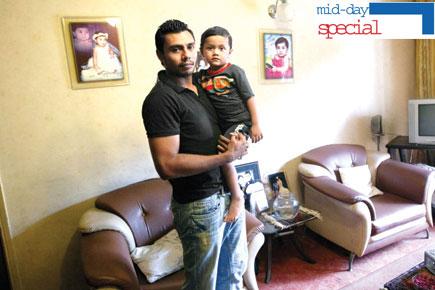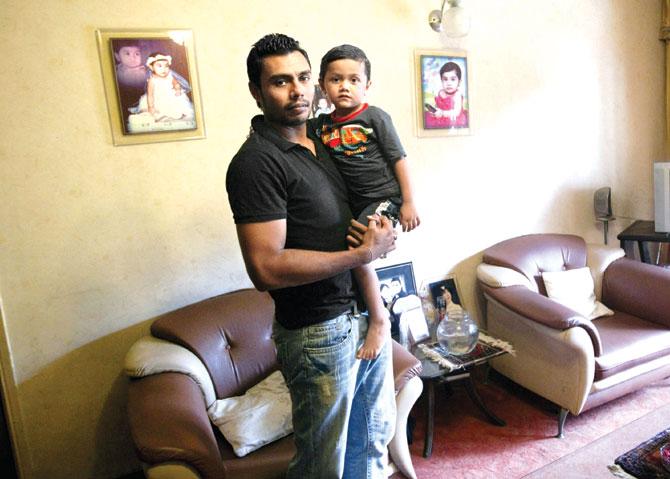Banned Pakistani spinner Danish Kaneria reveals to mid-day his dire financial condition and offers his coaching services to Indian spinners; wants BCCI to urge ICC to lift his match fixing-caused life ban

Former Pakistan spinner Danish Kaneria with his son at his Karachi residence in 2011
New Delhi: Former Pakistani spinner Danish Kaneria, life banned for spot fixing, wants the BCCI to push the International Cricket Council (ICC) to grant him "one last hearing".
ADVERTISEMENT
Also Read: 'Ban' of brothers: Cricketers who were banned for fixing

Former Pakistan spinner Danish Kaneria with his son at his Karachi residence in 2011. Pic/AFP
"It will save me, my life, and whatever cricket is left in me," Kaneria, Nani-Danny to his friends, told mid-day in a telephonic interview from his Clifton Road residence in Karachi recently. Kaneria said he was in England when his father died of cancer in April 2013, a week after he lost his England and Wales Cricket Board (ECB) appeal. He has to pay 100,000 GBP (approx Rs 96 lakh) to ECB as legal costs and lost his job with Habib Bank.
Also Read: Danish Kaneria challenges ECB petition in Sindh High Court
"I am living on my last savings. I do not know how long I will survive. I can even teach young Indians the art of spin, can't I? Why can't they call me? I am one of them," said Kaneria.
BCCI, his only hope
Though the life ban imposed on Kaneria for spot fixing while playing for Essex was based on solid evidence, the former spinner — he has lost three appeals (including two in UK courts) — still says he is innocent and the BCCI is his only hope, ostensibly because the Pakistan Cricket Board (PCB) — for all practical purposes — have shunned him. "Everything else has dried up for me in Pakistan, I seem to have no takers for my appeals from the PCB. I am dying.
Also Read: ECB bans spinner Danish Kaneria for life from English cricket
"It is because I am a Hindu, a minority in Pakistan. It is because I refused to admit my involvement in spot fixing when the ECB charged me. I want to be heard, is it very difficult to hear me out?"
He said the ICC refused to entertain his plea, its chief executive Dave Richardson saying it acted on the decision taken by the ECB and the decision will stay, for life. "I told him he was biased, many have been pardoned, why not me," said Kaneria.
The 35-year-old cricketer says he still feels there is a bit of cricket left in him, and the cricket boards should take a lenient view of the case. "The Scotland Yard found no evidence on me, the ECB reacted on the basis on confessions made by one cricketer. Look at the way PCB has handled Mohammad Amir's case. What about me? Isn't that unfair?" argued Kaneria.
'I was not involved'
But didn't Amir acknowledge his guilt and earn an opportunity for rehabilitation? "He did because he was involved, I didn't because I was not, I was not, I was not. It's almost like punishing me for introducing Mervyn Westfield to Anu Bhatt (an Indian businessman suspected of involvement in illegal cricket betting)."
What Kaneria did not say that he, along with other Pakistani players, attended a dinner at Bhatt's Delhi residence on Pakistan's 2007 tour of India, and even received gifts, including an expensive handset. The anti-corruption unit of ICC warned him in April 2008 but Kaneria introduced Westfield to Bhatt, said court records and transcripts of the ECB hearing.
Westfield conceded some runs in a Pro40 game against Durham on September 5, 2009 and was paid 6,000 GBP (approx R5 lakh). The crucial part of this entire show was that the cash was paid in Kaneria's car, in which Bhatt was present with another Asian. Westfield informed his teammate, Tony Palladino of the incident and the latter informed the club officials six months later. In April 2010, Essex police probing the match, questioned Kaneria but released him without charge while Westfield was eventually put on criminal trial in January 2012, when he pleaded guilty and was sentenced in February, 2012, to four months' imprisonment.
"And then they blamed me for everything, I was out of the national selection but still played domestic cricket in Pakistan," said Kaneria. But the judge in England named Kaneria as the influence who led Westfield astray. In June, 2012, an ECB panel found Kaneria guilty and banned him for life, showing as evidence text messages and telephone calls between Bhatt and Kaneria, the latter eventually admitting to the panel that he had introduced Bhatt to Westfield.
Kaneria also confirmed to the panel that he bought tickets for Bhatt to be in Durham for that game. Then came other damning evidence from other players at Essex, who said Kaneria would jokingly talk about spot and match fixing. But still, there was no proof that Kaneria was himself involved in match, or spot fixing.
Blamed for nothing
"I am blamed, punished for a crime I have not committed. When I appealed against the ECB ruling, Westfield did not even testify and yet, ECB was relying on his statements. Isn't this racism?"
Interestingly, Rashid Latif, a former Pakistan skipper, claimed in 2013 that Bhatt was a guest of the PCB during back-to-back home series in 2005 and 2006. PCB sued Latif but the case — very mysteriously — fell silent.
"See what I have been reduced to by the ECB, ICC and PCB. I cannot play any cricket which falls under the ambit of PCB. I cannot visit a PCB ground, nor I can train at their facilities. I cannot even meet my former cricketer friends. It's like living under house arrest," said Kaneria, who still trains for a few hours at the Karachi Parsi Institute Ground with some locals.
"Only BCCI can save me. Anurag Thakur (secretary) should consider my case and urge Shashank Manohar (president) to speak to the ICC. Lift the ban, help me get a honourable exit," added Kaneria.
 Subscribe today by clicking the link and stay updated with the latest news!" Click here!
Subscribe today by clicking the link and stay updated with the latest news!" Click here!






